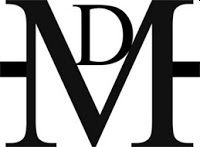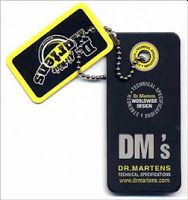The Board denied a petition to cancel the mark shown below
for various clothing items because Petitioner Dr. Martens failed to
prove its standing. Petitioner claimed, inter alia,
likelihood of confusion with its registered mark
DM'S for footwear, relying on various
documents by way of notice of reliance, including a copy of its
website and a Wikipedia entry describing petitioner. It attached a
photocopy of its registration to the petition for cancellation. The
Board found, however, that these documents did not support
petitioner's claim of standing. Dr. Martens International Trading GmbH v. Dejon
Marquis Muldrow, Cancellation No. 92067439 (May 12, 2020)
[not precedential] (Opinion by Judge Marc A. Bergsman).

Petitioner Dr. Martens contended that "[a]s the owner of The DM'S Mark, Petitioner unquestionably has a 'real interest' in challenging the registration of Registrant's DM Mark. Accordingly, there is no dispute that Petitioner has standing." [Apparently the applicant did not raise the issue - ed.].
The Board, however, pointed out that attachment of a photocopy of a registration to the petition for cancellation does not make the registration of record. See Trademark Rules 2.122(c) [documents attached to a pleading are not in evidence] and 2.122(d) [but a status and title copy or the electronic records of a pleaded registration submitted with the petition is accepted into the record].
Petitioner alleged that it has used the DM'S mark since 1992, but it failed to produce any evidence to make that fact of record.
As to the Wikipedia entry regarding Petitioner, an excerpt from Petitioner's website, copies of news articles regarding Petitioner, and excerpts from Petitioner's Facebook and Instagram accounts, that Internet evidence is admissible only to show what has been printed. It does not establish the truth of what has been printed. Safer Inc. v. OMS Investments, Inc., 94 USPQ2d 1031, 1040 (TTAB 2010). See also WeaponX Performance Prods. Ltd. v. Weapon X Motorsports, Inc., 126 USPQ2d 1034, 1038 (TTAB 2018) (although Internet evidence is admissible, it is "hearsay and may not be relied upon for the truth of the matters asserted therein.").
Statements in petitioner's notice of reliance describing certain documents purporting to show the relatedness of the involved goods were not made by a sworn witness, but by petitioner's attorneys, and therefore were not evidence. Cai v. Diamond Hong, Inc., 901 F.3d 1367, 127 USPQ2d 1797, 1800 (Fed. Cir. 2018), quoting Enzo Biochem, Inc. v. Gen-Probe Inc., 424 F.3d 1276, 1284 (Fed. Cir. 2005).
The Board therefore found that petitioner had failed to introduce any testimony or evidence sufficient to prove standing. And so it denied the petition for cancellation.

Read comments and post your comment here.
TTABlogger comment: A single testimonial declaration authenticating and identifying the various documents was all that was needed. If petitioner seeks review of this decision by way of a civil action under Section 1071(b), will it have the opportunity to include evidence of its standing? I believe so.

Petitioner Dr. Martens contended that "[a]s the owner of The DM'S Mark, Petitioner unquestionably has a 'real interest' in challenging the registration of Registrant's DM Mark. Accordingly, there is no dispute that Petitioner has standing." [Apparently the applicant did not raise the issue - ed.].
The Board, however, pointed out that attachment of a photocopy of a registration to the petition for cancellation does not make the registration of record. See Trademark Rules 2.122(c) [documents attached to a pleading are not in evidence] and 2.122(d) [but a status and title copy or the electronic records of a pleaded registration submitted with the petition is accepted into the record].
Petitioner alleged that it has used the DM'S mark since 1992, but it failed to produce any evidence to make that fact of record.
As to the Wikipedia entry regarding Petitioner, an excerpt from Petitioner's website, copies of news articles regarding Petitioner, and excerpts from Petitioner's Facebook and Instagram accounts, that Internet evidence is admissible only to show what has been printed. It does not establish the truth of what has been printed. Safer Inc. v. OMS Investments, Inc., 94 USPQ2d 1031, 1040 (TTAB 2010). See also WeaponX Performance Prods. Ltd. v. Weapon X Motorsports, Inc., 126 USPQ2d 1034, 1038 (TTAB 2018) (although Internet evidence is admissible, it is "hearsay and may not be relied upon for the truth of the matters asserted therein.").
Statements in petitioner's notice of reliance describing certain documents purporting to show the relatedness of the involved goods were not made by a sworn witness, but by petitioner's attorneys, and therefore were not evidence. Cai v. Diamond Hong, Inc., 901 F.3d 1367, 127 USPQ2d 1797, 1800 (Fed. Cir. 2018), quoting Enzo Biochem, Inc. v. Gen-Probe Inc., 424 F.3d 1276, 1284 (Fed. Cir. 2005).
The Board therefore found that petitioner had failed to introduce any testimony or evidence sufficient to prove standing. And so it denied the petition for cancellation.

Read comments and post your comment here.
TTABlogger comment: A single testimonial declaration authenticating and identifying the various documents was all that was needed. If petitioner seeks review of this decision by way of a civil action under Section 1071(b), will it have the opportunity to include evidence of its standing? I believe so.
The content of this article is intended to provide a general guide to the subject matter. Specialist advice should be sought about your specific circumstances.
